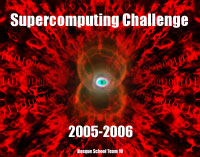Kickoff Materials
The Computational Science Process
This class is one hour long. No hands-on work. Get the students to talk with you as
much as possible during the class.
Here are files from past years:
The content for these documents was taken mostly from Dick Allen's STI PowerPoint presentation on the subject.
Feel free to use whatever materials you like.
Back to the top
The Abstract Sessions
The facilitators/instructors/scientists will meet the students
in their teams. The students will have copies of their abstracts with them.
The purpose of the session is to make sure the teams have chosen a problem
that is suitable for science, has measurable components so that a mathematical
model can be developed, and from that a computing solution can be written.
The session is secondarily about mentoring teams who have good abstracts
and are ready to get started on their project.
There will be computer available for teams to get their abstracts submitted.
Some students will come to this session and need help from scratch.
When the abstracts are ready, they, too, can submit their abstracts.
Students whose abstracts are complete can move to computers to begin research
or work at tables to plan their timeline, assign tasks to different members
of the team, etc. They will learn to use the phpbb bulletin board system
to communicate with their teammates. If there are facilitators who are not working with teams
to get their abstracts completed it would be great if they could do some
mentoring of teams who are ready.
It may be helpful to look at the abstract guidelines and the abstracts that
are already up on the Challenge web page - http://www.challenge.nm.org/abstracts.
There is also a link on the web page for questions to ask to direct the
students:
http://www.challenge.nm.org/glorieta/curriculum/tpd.html. Additionally,
http://www.challenge.nm.org/about/areas.shtml links to areas of science
and may be helpful for teams still looking for an idea. This guidelines
link can be useful, too. http://www.challenge.nm.org/about/guidelines.shtml.
We urge the students to step through the flow chart at
http://www.challenge.nm.org/ctg/overview/project.shtml.
You can see which teams have submitted abstract on the abstracts page of the
Challenge web site.
Back to the top
Introduction to Starlogo
Back to the top
Agent-based modeling with Starlogo
Back to the top
Math Modeling with Java
Back to the top
Advanced Class
This class is three hours long.
INTRODUCTION TO MONTE CARLO METHODS
This brief mini-course will introduce the student to one of the most powerful
and oldest numerical methods. Some of the Monte Carlo basics will be
used to integrate equations and simulate the random walk of particles
(neutrons, gamma-rays) through matter.
Students will manipulate template files written in C. Codes will be compiled
with the gcc compiler under the Cygwin environment on MS-Windows PCs.
PREREQUISITES:
Some programming experience in one of the following high-level languages:
C/C++, FORTRAN, JAVA
Mathematical experience:
Basic trig
Simple equations/functions (equation for a circle, natural logarithm, etc.)
Basic statistics (e.g., average, variance, standard error, etc.)
Class Materials:
Back to the top
Questions? Contact Consult
| 
